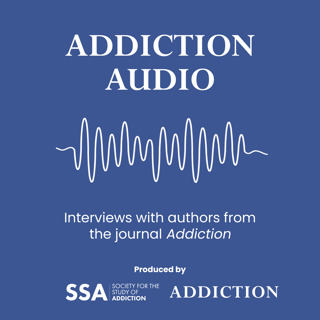
Smoking cessation trials with Zoe Swithenbank
In this episode, Rob Calder talks to Zoe Swithenbank about her recent article looking at how to improve research reports on smoking cessation trials. Zoe talks about the challenges of organising an international meeting of experts before the COVID-19 pandemic (before people were used to online working). She talks about some common errors and omissions that researchers make when reporting smoking cessation trials and how these can place limits on scientific progress. She talks about developing the CONSORT-SPI tool to help improve the ability of researchers to draw conclusions across studies."It was important to get that balance and try and get a good range, and we did have quite a variety of people...different backgrounds, different expertise which made for some interesting debates."Original article: Tailoring CONSORT-SPI to improve the reporting of smoking cessation intervention trials: An expert consensus study by Zoe Swithenbank and colleagues. Published in Addiction (2023) Hosted on Acast. See acast.com/privacy for more information.
26 Okt 202325min

Drug Consumption rooms with Laurence Lalanne
In this episode Ben Scher talks to Professor Laurence Lalanne about drug consumption rooms and the recent publication based on the COSINUS cohort study. They cover the range of interventions available in drug consumption rooms and how they can increase people's access to psychiatric support alongside barriers to accessing drug consumption rooms. Laurence talks about the epidemiological point of view in relation to the more biomedical aspects of drug consumption rooms, their objectives in reducing overdose and their impact on hospitals and the wider health-care system. "You need a very long follow-up....we need to follow for two years and three years to show important results about mental health and to see how they improve their well-being and access to other care."This is the second of a two-part podcast. The first, featuring Dr Marie Jauffret-Roustide, can be found here.Original article: Drug consumption rooms are effective to reduce at-risk practices associated with HIV/HCV infections among people who inject drugs: Results from the COSINUS cohort study by Laurence Lalanne and colleagues. Published in Addiction (2023). Hosted on Acast. See acast.com/privacy for more information.
18 Okt 202320min

Drug consumption rooms with Marie Jauffret-Roustide
In this episode Ben Scher talks to Dr Marie Jauffret-Roustide about drug consumption rooms and the recent publication based on the COSINUS cohort study. They cover a range of issues including the history of drug consumption rooms, the evidence on effectiveness and the challenges of studying this particular intervention.They also reflect on the social determinants of health and how drug consumption rooms can have a positive impact"We have 1% of people who attend drug consumption rooms who declared having ever shared injecting equipment in the last month before the interviews compared to 11% for people who were not exposed to drug consumption rooms"This is the first of a two-part podcast. The second, featuring Professor Laurence Lalanne can be found here.Original article: Drug consumption rooms are effective to reduce at-risk practices associated with HIV/HCV infections among people who inject drugs: Results from the COSINUS cohort study by Laurence Lalanne and colleagues. Published in Addiction (2023). Hosted on Acast. See acast.com/privacy for more information.
18 Okt 202337min

Drones delivering Naloxone with Caroline Copeland, Patrick Courtney and Paul Royall
In this episode, Rob Calder talks to Drs Caroline Copeland, Patrick Courtney and Paul Royall about their recent article assessing the time it would take for drones to deliver naloxone to people who are overdosing on opioids. The study team used NPSAD (National Programme on Substance Abuse Deaths) data to map out overdoses in Teeside over recent years and then to predict how long it would have taken a drone to make the journey and deliver naloxone to a bystander who would then be able to administer it. They then compared this time with the time it takes ambulances to attend the scene. Along the way they discuss take off stations, weather, traffic congestion, no-fly zones and the importance of considering whether a drone will be destroyed along the way."The initial design we came up with was a sort of cargo transport box on top of the drone, whereby the drone lands and then the bystander can remove the naloxone home kit or naloxone nasal spray from the top of that transport holder. At that point we then follow the guidance and recommendations of the at home naloxone or nasal spray." - Paul RoyallOriginal article: An evaluation of naloxone transit for opioid overdose using drones: A case study using real-world coroner data. By Caroline Copeland and colleagues. Published in Addiction (2023) Hosted on Acast. See acast.com/privacy for more information.
12 Okt 202328min

Canadian low-risk drinking guidelines
In this episode Dr Merve Mollaametoglu talks to Dr Catherine Paradis director of health promotion and scientific alcohol lead at the Canadian Centre of Substance Use and Addiction, Dr Kevin Shield from the Centre for Addiction and Mental Health in Toronto and Dr Peter Butt clinical associate professor Department of Family Medicine at the University of Saskatchewan.They discuss their recent article looking at ways of making of low-risk alcohol drinking guidelines. They talk about how difficult it is to reach consensus on low-risk alcohol thresholds and how scientific evidence and public opinion meet. And the development of their ‘risk-zone’ approach. And how this can be interpreted by people who had differing perceptions of risk.They talk about why people in alcohol focused cultures appear to be willing to accept a higher rate of risk from alcohol than they do from other risk-based activities."I would liken the development of the risk-zones the risk curves allowing people to situate themselves to other scientific discoveries….A lot of other public health agencies and a lot of people who have been involved in the development of these guidelines really are taken to the utility of those risk zones and hopefully we’ll see that picked up in a lot more guidelines as well” - Dr Kevin ShieldOriginal article: New perspectives on how to formulate alcohol drinking guidelines by Kevin Shield and colleagues. Published in Addiction (2023). Hosted on Acast. See acast.com/privacy for more information.
5 Okt 202340min

Social media and alcohol with Brandon Cheng
Dr Elle Wadsworth talks here to Brandon Cheng about his research on social media posting and drinking behaviour. Brandon talks about the influence that media and social media have on young people and how they can influence their drinking behaviour.“A young person watching a short video of people enjoying drinks [is] likely to develop a much more vivid imagery of what drinking can be like … compared to a viewer just to see an image or text relating to someone having a good time drinking.”Original article: A systematic review and meta-analysis of the relationship between youth drinking, self-posting of alcohol use and other social media engagement (2012 – 2021) by Brandon Cheng and colleagues. Published in Addiction (2023). Hosted on Acast. See acast.com/privacy for more information.
26 Sep 202317min

Cannabis, sport and anti-doping regulations with Tom Hudzik
In this episode Dr Rob Calder talks to Dr Thomas Hudzik about his work with the World Anti Doping Agency (WADA). Tom talks about the three principles by which a substance is assessed and how they use the latest research and policy changes to make decisions about whether a substance is banned and how it is detected. They specifically cover the decision to implement and in-competition ban cannabis and the basis on which that decision was made."The substance use can represent a risk to the athlete's health them-self or the health of those around them.... somebody who is allowed to perform in a group type of situation, their judgement will be impaired most likely. And that may affect the score that you have, but it could also mean that you do something silly physically that you might not have done otherwise because your reaction time is slow, your temporal estimation capabilities are slow." Original article: Cannabis and sport: A World Anti-Doping perspective by Thomas Hudzik and colleagues. Published in Addiction (2023) Hosted on Acast. See acast.com/privacy for more information.
21 Sep 202323min

Fentanyl, poly-substance use and the US opioid epidemic with Joseph Friedman
Ben Scher talks to Dr Joseph Friedman about his research on fentanyl overdoses. Joseph explains the four waves of opioid overdoses in the US and how opiate and opioid overdoses have changed.They discuss how patterns of poly-substance use are different across the US and how the combination of fentanyl and methamphetamines is become more prevalent across states. Along with the challenges of standardising results when coroners’ reports vary across the US.One of the main takeaways here is just understanding that poly-substance drug overdose is really becoming the norm….The percent of US overdose deaths involving both fentanyl and stimulants in 2010 was 0.6% so one in every 200 overdose deaths and by 2021 it rose to one-third of all [overdose] deaths.Original article: Charting the Fourth Wave: Geographic, Temporal, Race/Ethnicity, and Demographic Trends in Polysubstance Fentanyl Overdose Deaths in the United States, 2010-2021 by Joseph Friedman and colleagues. Published in Addiction (2023) Hosted on Acast. See acast.com/privacy for more information.
13 Sep 202315min




















